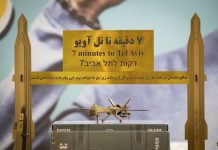By Ahmad Rafat
Thirty-eight-year-old Maureen Nehedar was only two-and-a-half when she emigrated with her family from Isfahan to Israel. It was during the early years of the Revolution, when many Persian Jews were leaving their homeland. Maureen and her family were determined not to forget their roots.
Music was one of the ways of maintaining a relationship with the homeland. And the music of Maureen has proved to be a hit among Israelis: both of her albums have gone on to become nationwide bestsellers.
Maureen started singing at the age of 10 and later studied Western classical music.
“I grew up with Persian music, with the songs that my grandmother whispered in my ears, and this music is an inseparable part of my life and memories,” says Maureen in a conversation with Kayhan London. “My roots and that of both sides of my family are in Iran. Persian music was the first music I got to know, specifically the folk songs that my grandmother used to sing.”
After the family’s move to Israel, she started working with one of Israel’s great Iranian classical musicians: Menashe Sasson, master of the Persian santur. After performing with the Ensemble Esfahan, under Maestro Sasson’s direction, Maureen embarked on her own musical journey.
Besides singing and composing, Maureen also plays the acoustic guitar and the setar.
Two albums have come out of her years of research into Persian music. The first – “Asleep in the Bosom of Childhood” – instantly landed on Israel’s Top 10 list, then went on to be the country’s bestselling album for several weeks.
“Entirely based on Persian music, this album was arranged for traditional Persian instruments such as the kamancheh, ney (Persian flute), tombak (percussion) and setar, alongside Western musical instruments. My aim in recording ‘Asleep in the Bosom of Childhood’ was to pay tribute to Persian music on the one hand, and to keep alive the religious music of Persian Jews on the other.”
“At a time when everyone is seeking success with pop music, I took a risk by focusing on traditional music, though rearranged in a new way. This was not only welcomed by the Persian community in Israel, but was also appreciated by others.”
Maureen’s latest album “Gole Gandom,” released recently, has also been a huge success. It was on the Top 10 list immediately after its release, and the best- selling CD in Israel a few months ago. In its review, the prominent Israeli newspaper Haaretz wrote: “This Israeli singer’s Farsi album is breathtaking.”
“Gole Gandom” is a collection of Persian folksongs that include “Ay Sareban,” “Juni Juni,” “Mastom – Asmar,” and of course, “Gole Gandom.”
“Singing traditional Persian music is not easy. It requires years of training with great masters, and we do not have any Persian classical singing masters in Israel. Having great living masters of Persian classical music like Mohammad Reza Shajarian makes it all the more difficult to perform Persian classical music. That’s why I turned to folk music, which is both simpler and more familiar to me since childhood.”
“I did not change anything to the way of singing the folk songs, but rearranged the music by adding Western musical instruments alongside the traditional instruments.”
Maureen characterizes Iranian folk music as very rich. “Iran has many facets; each region has its own specific culture, and folk music is certainly a manifestation of this striking diversity.”
A philharmonic orchestra accompanies Maureen on most of the “Gole Gandom” album tracks, except for “Lalaiy Homayoun” – which the artist performed with her grandmother. That song is only accompanied by a few bells and the sound of a child.
“It took me weeks before I managed to convince my grandmother to sing,” Maureen recalls. “I arranged this song like a movie soundtrack, because in a way it’s the film of my life and that of my grandmother’s.”
Maureen believes that the track with her grandmother is the most powerful piece on the album; she received many letters from listeners saying that they had tears flowing down their cheeks when they heard it.
Maureen doesn’t follow contemporary Iranian pop music, though it’s only form of music played at Iranian weddings and celebrations in Israel. In addition to Shajarian, the singers Maureen particularly appreciates are Haydeh, Delkash, and Sima Bina.
“Of course, I also like Googoosh’s old songs, the ones she sang before the Revolution,” she hastens to add.
Maureen would like to work with Iranian artists in the future – “only those that are active in the field of music. Of course, I am hopeful that my being Israeli will not cause problems for them.” She intends to travel to Europe and America with her “Gole Gandom” album, and to perform “in cities with a large Iranian diaspora, as this music is the heritage which we all share as Iranians.”
While Maureen speaks Farsi with difficulty, in “Gole Gandom” she sings with no accent. In everyday speech, she has no trouble understanding Farsi, as it’s the spoken language in her family. Yet she sometimes has to search for the right word when speaking.
“I would love to be able to speak Farsi properly and without an accent,” she says, wistfully. “Unfortunately in a society where the native language is not Farsi, fulfilling this dream is not easy.”













